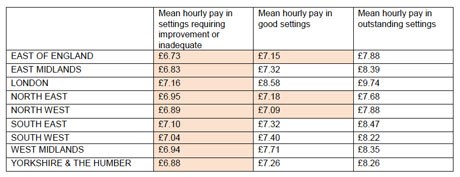Paying nursery staff just £1.45 an hour more could boost poor quality to outstanding
Wednesday, February 10, 2016
The link between staff pay and a nursery's Ofsted grade is exposed in a new report by the Family and Childcare Trust.

Staff in outstanding nurseries were paid just £1.45 more on average at £8.37 an hour than those in settings that were inadequate or requiring improvement, who were paid £6.92 an hour.
By analysing 900 job advertisements placed between October and December 2015 the researchers found a strong link between early years settings’ Ofsted grades and pay rates, with higher wages associated with high-quality provision.
Early years workers in the lowest quality nurseries and pre-schools were also earning less than the incoming national living wage in all regions in England.
Non-supervisory staff in outstanding nurseries are paid on average £1 an hour more than those in good nurseries, the report 'In for a pound' found.
Staff working in outstanding nurseries and pre-schools were paid on average £8.37 an hour, compared to £7.44 in good settings – a difference of 93 pence an hour.
The association between better paid staff and quality was found in all nine regions in England (see table below), with staff working in outstanding settings paid on average 12 per cent more than those in good settings.
Average gross hourly wage for non-supervisory early years staff by Ofsted grade, regional breakdown

Source: Family and Childcare Trust
The gap between wage rates and quality was most clearly seen in London where staff in outstanding settings are paid £2.58 an hour more – 36 per cent higher - than those that are graded inadequate or requires improvement.
There was a weaker association between pay and quality in the north of England. In the North East, hourly wages in outstanding settings were just 11 per cent higher than those graded requires improvement or inadequate.
The research also found that the impact of the new national living wage - £7.20 an hour for staff over 25 from April and rising to £9.20 by 2020 - will be felt the most by settings requiring improvement or inadequate.
This is because the average hourly pay rates in settings with the lowest Ofsted grades were below £7.20 in all parts of England including London.
To improve the life chances of disadvantaged children through free early education the Government must address quality, the Family and Childcare Trust says.
'Higher quality care may be more expensive for both parents and tax payers. But within current qualification regimes, our research indicates that a relatively small increase in staff wages - less than a £1 an hour - may turn good childcare provision into provision that is outstanding, thus boosting children's outcomes,' the report says.
Julia Margo, chief executive at the Family and Childcare Trust said, ‘It is no surprise that higher pay produces higher quality provision. We know that only good quality childcare makes a positive difference to the lives of disadvantaged children which is why we are calling on the Department for Education to address low pay in its forthcoming early years’ workforce strategy.
‘Longer term, we want to see a fully graduate-led workforce with a minimum professional rate of pay, bringing early years professionals in line with their school colleagues. Without this, low pay will continue to discourage highly skilled people from joining the profession and will affect the quality of care received by our children.’
The findings come at a crucial time of change for the sector, ahead of the early years funding review for the 30-hour policy, and a new workforce strategy.
The report says, ‘The forthcoming early years workforce strategy should support a qualified workforce and address low pay by committing to fund free childcare at a level that supports a fully graduate-led workforce and a minimum professional rate for early years staff.’
'Quality costs'
Early years organisations said they were not surprised by the findings and called on the Government to invest more.
National Day Nurseries Association (NDNA) chief executive Purnima Tanuku said, ‘A stable team of well qualified staff is established as a critical factor in providing high-quality early learning and childcare, so it's no surprise that nurseries with higher Ofsted grades tend to have better paid staff.
‘The limiting factor on pay is chronic underfunding of free nursery places. When the Government extends the number of free childcare hours, starting from September this year in some areas, it will become the main purchaser of childcare nationally.
‘It is therefore vital that nurseries and their staff get a fair deal. The Government's promised funding review is underway and it must result in a higher hourly rate that supports a properly paid workforce.’
The Pre-school Learning Alliance said it was not surprised by the research.
Chief executive Neil Leitch said, ‘It is well-known that the early years sector is historically one of low pay. Many providers would love to be able to pay their staff a higher wage; however, a continued lack of adequate funding simply does not allow for them to do. As such, objective evidence that demonstrates a direct link between wages and Ofsted outcomes is clearly something that the Department of Education needs to take into consideration when developing future early years policy.
‘As we have stated time and time again, quality costs. If the Government is serious about improving standards within settings – and ultimately achieving better outcomes for children - they need to invest what is needed to do so.’
Voice, the union for education professionals, also backed the report. General Secretary Deborah Lawson said, ‘Nursery staff are skilled professionals who deserve to be well paid and this report demonstrates a link between pay and quality of outcomes.
‘Offering sufficient high quality places staffed by ‘decently paid’, well qualified, highly trained professionals clearly has a huge impact on affordability, but this nettle must be grasped by those in government. Places need professionals. Quality costs but this is a cost that has been borne by the profession for too long.
'Implementing robust long-term recruitment and retention strategies now is essential for the sustainability of both the profession and provision.
‘There must also be coherent, appropriate and status-raising pay and career structures for childcare professionals.’
Commenting, the Department for Education said the Government was spending over £1billion extra per year on the free entitlements by 2019-20, and that £300m per year of this would be spent on increasing the national average funding rate. They also stressed that councils should pass on the funding in full to childcare providers.
A DfE spokesperson said, 'We are making a significant investment in the early years sector and have worked closely with the profession to help raise its status – and as a result salaries have increased, numbers of qualified staff have risen, and a record number of providers are rated Good or Outstanding.
'But we are not complacent, we have committed to raising the average hourly rate providers receive - a move that has been welcomed by the industry - and have undertaken the first comprehensive review of childcare costs to set a new average hourly rate that is fair for providers and delivers value for money for the taxpayer.'
- The report ‘In for a pound’, the relationship between staff wages and Ofsted grades in group-based childcare provision was sponsored by Community Playthings.






